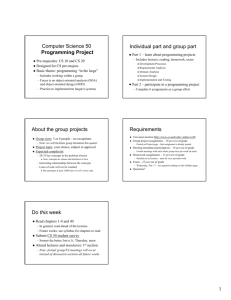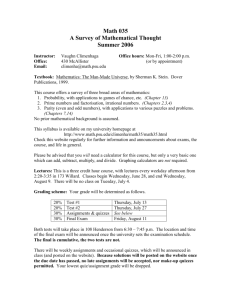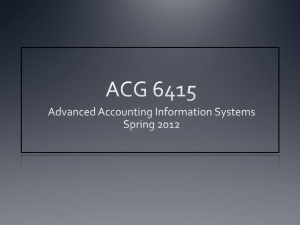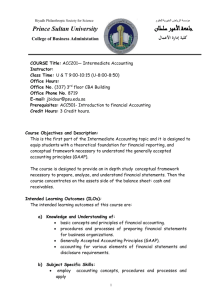Pamplin College of Business
advertisement
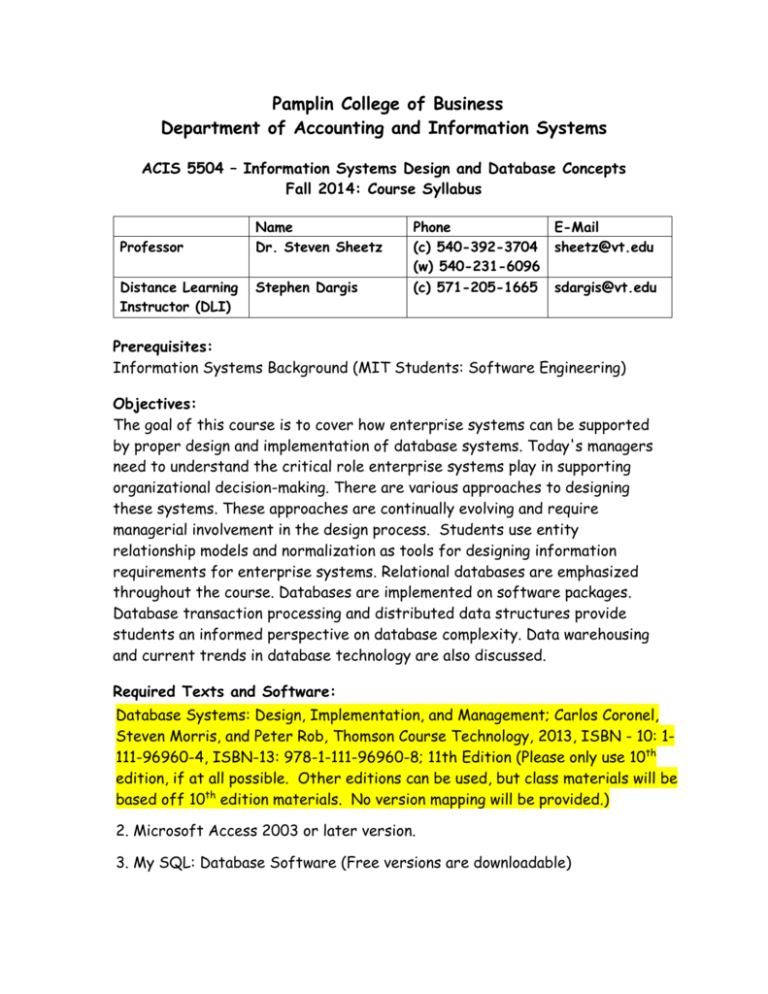
Pamplin College of Business Department of Accounting and Information Systems ACIS 5504 – Information Systems Design and Database Concepts Fall 2014: Course Syllabus Professor Distance Learning Instructor (DLI) Name Dr. Steven Sheetz Phone (c) 540-392-3704 (w) 540-231-6096 E-Mail sheetz@vt.edu Stephen Dargis (c) 571-205-1665 sdargis@vt.edu Prerequisites: Information Systems Background (MIT Students: Software Engineering) Objectives: The goal of this course is to cover how enterprise systems can be supported by proper design and implementation of database systems. Today's managers need to understand the critical role enterprise systems play in supporting organizational decision-making. There are various approaches to designing these systems. These approaches are continually evolving and require managerial involvement in the design process. Students use entity relationship models and normalization as tools for designing information requirements for enterprise systems. Relational databases are emphasized throughout the course. Databases are implemented on software packages. Database transaction processing and distributed data structures provide students an informed perspective on database complexity. Data warehousing and current trends in database technology are also discussed. Required Texts and Software: Database Systems: Design, Implementation, and Management; Carlos Coronel, Steven Morris, and Peter Rob, Thomson Course Technology, 2013, ISBN - 10: 1111-96960-4, ISBN-13: 978-1-111-96960-8; 11th Edition (Please only use 10th edition, if at all possible. Other editions can be used, but class materials will be based off 10th edition materials. No version mapping will be provided.) 2. Microsoft Access 2003 or later version. 3. My SQL: Database Software (Free versions are downloadable) Total Course Grades: Mid Term Exam: Format: On-Line Exam Available from October 12 at 7am thru October 14 at 11 pm 150 Final Exam: Format: On-Line Exam Available from December 14 at 7am thru December 16 at 11 pm 150 Assignments (4 total @ 25 points each) 100 Semester Project 100 Total 500 Grades: Grades are based on an absolute scale. >=93% A >=90% A- >=87% B+ >=83% B >=80% B- >=77% C+ >=73% C >=70% C- >=67% D+ >=63% D >=60% D- <60% F Assignment & Project Schedule Assignment 1 due September 30th (Posted at start of course) Assignment 2 due October 11th (Posted at start of course) Assignment 3 due November 11th (Posted after MS Access lecture) Semester Project due December 9th (Posted after normalization lecture) Assignment 4 due December 9th (Posted after mid-term exam) All assignments are due and should be time stamped in scholar by midnight of the due date. For example, assignment #1 is due by 11:59 pm and 59 seconds on February 25th. If it is time stamped 12:00 am or after on February 26th, it will be considered late. Late penalties are not large and it is always better to submit a partial answer rather than no answer. Class Meetings on WebEx: This class will meet online using WebEx on Tuesdays at 6:30 p.m. for approximately an hour for a live session. Most of the sessions will be open format where students can ask questions about all course topics. Others will be focused on a particular skill or technique. The recording of these sessions will be available on the website after class. Class attendance is not required, but strongly encouraged. If you cannot attend a class, please be sure to listen to the recording for that week at your convenience. Occasionally, pre-recorded lectures may be used in place of live lectures. Class Preparation: You are expected to read the Chapters assigned for each week. The textbook is the primarily source of information for the course. Recorded lectures for each chapter are posted on scholar along with lecture notes/slides on which they are based. The lectures are not exhaustive and are meant to focus on selected topics that are considered to be important or difficult from each chapter. The lecture notes, the lecture recordings, the live question and answer sessions, and the assigned readings should prepare you well for the course assignments and exams. Exam and Assignment Makeup/Late Policy: Please note exam dates and times and make necessary arrangements at the beginning of the semester. It is mandatory that exams be taken at the date and time indicated. In the event that that is not possible, arrangements must be made well in advance with the DLI. Any make-up exams should be taken prior to the class scheduled exam date. Any medical issues interfering with the performance of class duties should be established and verified by a physician. Projects and assignments cannot be submitted late without penalty. A three point per day penalty (from the points allotted for the assignment) will be assessed for late submissions until the key for the assignment is released for those that completed the assignment on time. After which assignments will no longer be accepted. It is almost always better to submit a partial response rather than nothing, as partial credit is awarded. Semester Project: A complete database should be designed and implemented using Microsoft Access (or another database program of your choosing). A real business application or your own application (e.g. your own idea) may be selected. Also, a detailed project report should be submitted on the due date. This project is to be done individually. You are expected to exhibit creativity in the development of your project. This may require additional reading, research, and use of software not specifically covered in class. A full project description with further details will be posted around the mid-term exam. The Honor System: The Honor Code will be strictly enforced in this course. All aspects of your coursework are covered by the honor system. Honesty in your academic work will develop into professional integrity. The following are some specific policies regarding assignments and exams. 1. Students are allowed to help each other complete assignments, but do not ask other students for answers, only ask clarifying questions. You are expected to do all course work on your own. If you need help, your DLI is there to assist you. 2. Use of previous semester’s materials is absolutely not permitted on any assignment or test in the class. Violation of this policy will result in an honor code violation and an “F” for the course. *Lecture Schedule –Fall 2014 Week Week #1 Date August 26 Lecture 1 Lecture 2 September 2 Lecture 3 September 9 Lecture 4 September 16 Lecture 5 September 23 Lecture 6 September 30 Lecture 7 Lecture 8 October 7 Lecture 9 OCTOBER 12-14 Lecture 10 October 21 Lecture 11 October 28 Lecture 12 Lecture 13 November 4 Lecture 14 November 11 Lecture 15 November 18 Lecture 16 November 25 Lecture 17 December 2 Lecture 18 December 9 Material Covered Course Introduction Lecture Notes Database Fundamentals Chapter #1 Data Models Chapter #2 Week #2 NO LIVE LECTURE Relational Model Chapter #3 Week #3 Q&A Entity/Relationship Modeling Chapter #4 Week #4 ER Modeling Example Advanced Data Modeling Chapter #5 Week #5 Q&A Normalization Chapter #6 Week #6 Q&A SQL Chapter #7 Advanced SQL Chapter #8 Week #7 SQL Examples Mid-Term Review Lecture Notes Week#8 MID-TERM EXAM NO CLASS MS Access Lecture Notes Week #9 Q&A Database Design Chapter #9 Week #10 Q&A Web-Based Databases Lecture Notes DB Connectivity and Web Chapter #14 Week #11 Online Survey System Example DB Transactions and Concurrency Chapter #10 Week #12 Q&A DB Performance and Optimization Chapter #11 Week #13 Examples of fast and slow SQL Distributed DBMS Chapter #12 Week #14 THANKSGIVING BREAK NO CLASS Data Warehousing Chapter #13 Week #15 Q&A DB Administration and Security Chapter #15 Week #16 Final Exam Review Lecture Notes & Project due Week #17 December 14-16 Final Exam *All material and dates on this schedule (and on the syllabus) are subject to change based on the instructor’s discretion
